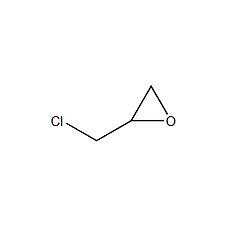
Structural formula
| Business number | 02U4 |
|---|---|
| Molecular formula | C3H5ClO |
| Molecular weight | 93 |
| label |
1-Chloro-2,3-epoxypropane, epichlorohydrin, Methyl chloride, 1-Chloro-2,3-epoxy propane, Aliphatic alcohols, ethers and their derivatives, organic insulating materials |
Numbering system
CAS number:106-89-8
MDL number:MFCD00005132
EINECS number:203-439-8
RTECS number:TX4900000
BRN number:79785
PubChem number:24845326
Physical property data
1. Properties: Colorless liquid with an odor similar to chloroform.
2. Boiling point (ºC, 101.3kPa): 116
3. Melting point (ºC): -457.2
4. Relative density (g/mL, 15/4ºC): 1.18683
5. Relative density (g/mL, 20/4ºC): 1.181
6. Relative density (g/mL, 25/4ºC): 1.17455
7. Relative vapor density (g/mL, air=1): 3.29
8. Refractive index (20ºC): 1.43805
9. Refractive index (25ºC): 1.4358
10. Viscosity (mPa·s, 0ºC): 1.56
11. Viscosity (mPa·s, 25ºC): 1.03
12. Flash point (ºC): 40.6
13. Heat of evaporation (KJ/mol, b.p.): 37.93
14. Heat of formation (KJ/mol, calculated value): 582
15. Heat of combustion (KJ/mol): 1750
16. Specific heat capacity (KJ/(kg·K), 20ºC, constant pressure): 1.40
17. Critical temperature (ºC): 351.3
18. Critical pressure (MPa): 4.9
19. Conductivity (S/m, 20ºC): 5.4×10-8
20. Thermal conductivity (W/(m·K), 20ºC): 0.0733
21. Vapor pressure (kPa, 20ºC): 1.73
22. Volume expansion coefficient (K-1, 55ºC): 0.00104
23. Lower explosion limit (%, V/V, calculated value): 5.23
24. Explosion upper limit (%, V/V, calculated value): 17.86
25. Solubility: Slightly soluble in water, miscible in alcohol, ether, ethanol Chlorinated carbon, benzene. At 20°C, the solubility of epichlorohydrin in water is 6.58% (mass), and the solubility of water in propylene oxide is 1.47% (mass). This product can form an azeotrope with water, with a boiling point of 88°C and a water content of 28%.
Toxicological data
1. Irritation: Repeated application can cause extensive necrosis of animal skin. The liquid is significantly irritating to the eyes.
2.Materials and casting materials, etc. Chlorohydrin rubber produced with epichlorohydrin as raw material is a new type of rubber. It is not easy to expand in ordinary oils and ordinary solvents. It has greater flexibility at low temperatures without plasticizers and is superior to nitrile and chlorine. Some unique features of butyl and butyl rubber. In addition, 3-chloro-1,2-epoxypropane can also be used as a plasticizer, fiber treatment agent, stabilizer, insecticide and fungicide, pharmaceutical raw material, etc.
2. It is an important raw material and intermediate for organic synthesis. Used in the production of epoxy resin and as a diluent for epoxy resin. It is also used in the manufacture of glycerin, nitroglycerin explosives, fiberglass, glyceryl methacrylate, chlorohydrin rubber, glycidyl derivatives, surfactants, electrical insulation products, etc. It is also a common raw material for manufacturing a variety of adhesives, medicines, pesticides, plasticizers, ion exchange resins and other products. It is also used as a solvent for adhesives, coatings, paints, rubber, resins, cellulose esters and cellulose ethers.

 微信扫一扫打赏
微信扫一扫打赏

